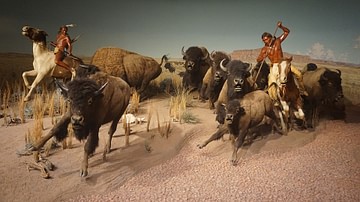Search
Search Results

Video
Gardens in Indian Art - Jahangir and Prince Khurram with Nur Jahan
Tour this famous Indian Royal Garden as depicted in a 17th C. painting.

Video
Mahabharata: the Ancient Indian Epic
The Mahabharata is an Ancient Indian Epic and is the longest epic poem in the world. It was believed to have been composed as early as the 4th c. BCE or even earlier by the sage Vyasa (who is also a character in the story). As a whole, the...

Video
Zitkala-Sa - Old Indian Legends: Iktomi And The Muskrat
OLD INDIAN LEGENDS..... Fourteen Old Indian Legends by Native American (Dakota) Author Zitkala-sa. These Legends feature the exploits of Iktomi the Native American Trickster god. AUTHOR BIOGRAPHY..... Zitkala-Ša (1876–1938) which translates...

Video
The 1622 Indian Massacre: A Personal Story
In my lecture on the Virginia Colony (https://www.youtube.com/watch?v=BvokFncxkh8), I discussed the strained relationship between the English colonists and the Powhatan Indians that culminated in the 1622 Indian Massacre, in which over 300...

Article
The Ajanta Caves
The 30 caves at Ajanta lie to the north of Aurangabad in the Indhyadri range of Western Ghats. The caves, famous for their temple architecture and many delicately drawn murals, are located in a 76 m high, horseshoe-shaped escarpment overlooking...

Video
White Buffalo Calf Women's Society Offers Shelter
Stay informed about South Dakota news, weather, and sports Follow KELOLAND News on our website and social channels: https://www.keloland.com/ https://www.youtube.com/user/kelolandnews https://www.facebook.com/keloland/ https://twitter.com/keloland...

Video
The Pawnee Seed Preservation Society Revive Ancient Ties to Ancestors | Seed Warriors | PBS
Official website: https://to.pbs.org/3BtRjWU In Seed Warriors, filmmaker Rebekka Schlichting follows a group of seed keepers as they work to regain food sovereignty in their ancestral homelands of Nebraska. By reclaiming their sacred corn...

Article
Buffalo and the Plains Indians
The buffalo were essential to the Plains Indians, and other Native American nations, as they were not only a vital food source but were regarded as a sacred gift the Creator had provided especially for the people. Buffalo (bison) supplied...

Definition
Little Crow (Eastman's Biography)
Little Crow (Taoyateduta, also known as Little Crow III, l. c. 1810-1863) was a Dakota Sioux chief best known as the leader of the Mdewakanton Dakota (Santee) Sioux during the Dakota War of 1862. After years of trying to maintain peaceful...

Definition
Social Contract
The social contract is an idea in philosophy that at some real or hypothetical point in the past, humans left the state of nature to join together and form societies by mutually agreeing which rights they would enjoy and how they would be...